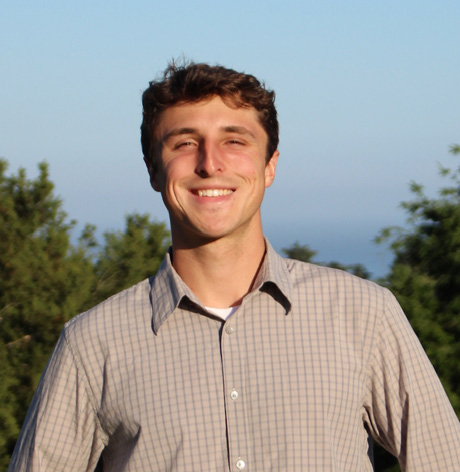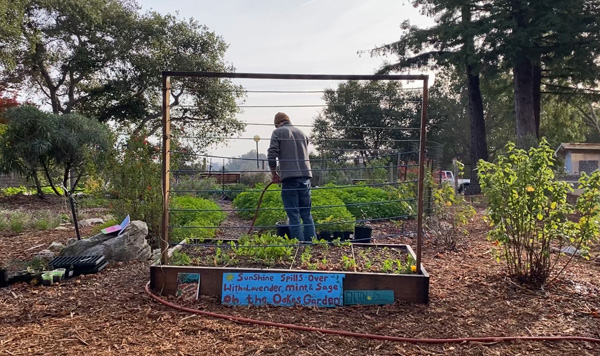Tell us a bit about yourself, your background, and how your path led to where you are today.
I was born and raised in suburban San Diego. My parents moved to CA in the late 80s after going to college in Indiana. My maternal relatives had farms in Illinois until very recently, and I was taught to be proud of and curious about agriculture from a young age. However, there were no school or community gardens in the neighborhood I grew up in. Few houses planted fruit trees or had front yard gardens. I attribute this to the tract home, suburban sprawl of my area, but also to the drought measures of southern California.
I grew up in. Few houses planted fruit trees or had front yard gardens. I attribute this to the tract home, suburban sprawl of my area, but also to the drought measures of southern California.
Really, it was through YouTube that I was exposed to permaculture, regenerative ranching, composting, market gardening, and other aspects of small-scale agriculture. I think that in the world of gardening and agriculture, the internet is often underappreciated as a tool for learning and sharing a message. Social media has made it easier for small-scale, regenerative producers and educators to gain an audience and swing the pendulum toward sustainability.
While I attended my first year at UCSC, 2020-21, virtually from San Diego, I yearned for the forests and creeks of Santa Cruz. At this same time, I took up gardening at home, and I became more conscious of the issues with our food system and waste streams. My sophomore year in Oakes College offered a blank slate, not only for gardening, but for building community and establishing relationships with campus faculty.
The Oakes College Garden became my second home. In the last three years, we have helped turn a fallow, relatively unknown campus garden into a vibrant space for students to grow food, relieve stress, and take tangible action to reduce their environmental footprint.
While I am a Business Management Econ. major, when I found the Sustainability Studies Minor as a third year, those courses received the majority of my academic energy. The hands-on nature of the Sminor was synergistic with my goals of promoting sustainability through experiential education in Oakes, and of strengthening a network of sustainability-focused student leaders across campus.
Support from campus faculty and grant organizations has also been instrumental to my success at UCSC. Prof. Alexie Leauthaud encouraged me to apply to the Earth Futures Institute Frontier Fellowship, where my research focused on advancing composting through community engagement. Furthermore, the Measure 43 Initiative and Campus Sustainability Council have been key financial supporters of the Oakes Garden.
I understand you have developed a compost program in the apartments in Oakes, that supplied the Oakes garden with composting material. How did that come about, and what was the most challenging and the most rewarding part of this project?
The Oakes College Compost Program was conceived as a solution to two immediate problems we faced in the Oakes Garden:
- As an organic garden, we needed to routinely amend the garden beds with clean and nutritious compost for soil health and plant production. Commercial compost can be expensive, and as students, our financial and logistical means were unable to meet the garden’s needs.
- The UCSC campus has been striving to reach its Zero-Waste goals for many years, and we saw a way that we could help promote these objectives at little cost.
The Oakes College Compost Program began in the Winter of 2023 as a food-waste composting service for the Oakes College apartments and the Oakes Cafe. We sought to create a model of student-run, on-site waste diversion, with a focus on service learning.
We sometimes run into challenges with stakeholder communication and user participation, but these are expected problems. It will always be our goal to enhance relationships across the campus community and to garner full participation in food waste diversion. It is hugely rewarding to see the multifaceted impact we have made, not only in Oakes but across campus. We have transformed 4 tons of food waste into garden soil fertility and hundreds of students have participated in our workshops. The Oakes composting program has coincided with increased campus-wide compost efforts led by the Sustainability Office. Our program offers the additional reward of seeing your food waste used on campus to the benefit of nature and other students.
Since the beginning, it has been important that we keep reliable records of our food waste diversion and compost process. As a young, student-run program, we knew that data would be a powerful tool for presenting our program’s impact to students, campus administrators, and granting bodies. Moreover, it is personally rewarding to quantify the cumulative impact we have made over the course of a year.
We collect food waste from two sources, the Oakes apartments and the Oakes Cafe. The apartments discard a mix of post-consumer food waste, while the Cafe contributes buckets full of coffee grounds, egg shells, and spoiled  salad greens. Each waste stream is quantified before being combined with grass and leaves in a pile. Each pile, roughly 600 lbs of food waste, will be garden-ready compost in about six months.
salad greens. Each waste stream is quantified before being combined with grass and leaves in a pile. Each pile, roughly 600 lbs of food waste, will be garden-ready compost in about six months.
Our data is managed on a very basic google sheet, but the process and conversion rates are informed by more complex systems at other universities. Before our program began, all of the food waste we now process was being sent to the landfill in unknown quantities. With data collection, we are able to inform campus decision-makers and future waste diversion programs, which go beyond just composting.
What are your plans for the near future and what do you see yourself doing next?
Through the garden, I have been exposed to many aspects of sustainability, from resource conservation to carbon accounting to education and behavioral change. The challenge for my generation is to find livelihood and purpose that will contribute to a brighter future, within the constraints of our finance-motivated, capitalist world. I co-lead a campus club called Eco-Capitalists that elaborates on this concept, connecting students with companies, technologies, and internships that advance sustainability, but that will also provide for our financial needs as individuals.
In the short term, I plan to pursue work in rainwater/greywater harvesting and environmentally friendly landscaping with local companies. Santa Cruz is a hub for environmentally conscious enterprises. In the long term, I hope to start my own company in this field. I have a knack for sales and project design, yet I prefer to work outside and with my hands. I hope to spur a shift in our perceptions of waste, dwellings, and aesthetics. Human activity does not have to mean the loss of habitat, biodiversity, and ecosystem services. I will prove that we can work alongside nature to regenerate planetary value even in the context of a money-driven economy.
What does sustainability mean to you?
Sustainability, unfortunately, is not enough to overcome the growing climate challenges that we face. To sustain the status quo would be a planetary disaster. We must hold the sustainability of human activity, resources, planetary processes, and biodiversity as the bare minimum for our future. More importantly, we should strive to replace conventional, exploitative systems with systems that are innately regenerative. We should not strive to keep things as they are, we should strive to make them better.
Is there anything else about the work you do that you would like to share?
To student readers, be persistent. Organizing programs and events on campus can be daunting, and the UC bureaucracy can be difficult to navigate. Be persistent. The staff and faculty at UCSC want to see you succeed, and they want to see the campus improve. You may have to send a dozen emails or attend a dozen events before you make the right connections. The Oakes Compost Program was not predestined to succeed. It was through student dedication and the relationships we have built with faculty that we are able to speak to our successes today.
Composting is an innate component of gardening, my primary source of enjoyment. I can be found in the Oakes Garden just about every day and in my home garden every evening. I live for the friends I have made and the community we have built around the garden.
I love to cook. It feels like a puzzle to make a nice meal of what can be pulled from the garden and campus pantries. I make 4 loaves of banana bread every week for our garden workdays. Please join us at the Oakes Garden every Sunday from 11 am-1 pm during the academic year for planting, painting, and other garden activities.
Check out this video about the Oakes Garden composting by Gabriel Schiering and Lydia Oitman.
